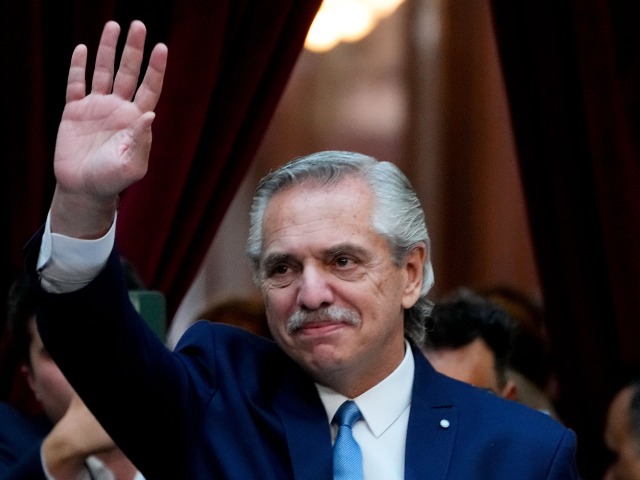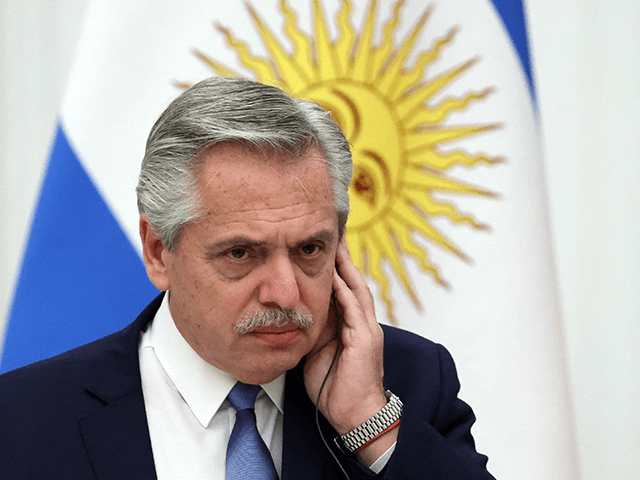Argentina’s outgoing leftist President Alberto Fernández announced in an interview given to the Spanish newspaper El País over the weekend that he will move to Spain after his presidential term ends on December 10.
Asked by El Pais what his plans are for December 11, the day after he hands over the presidency to Milei, Fernández claimed that he has “some proposals to go to Spain to teach again.” Fernández, a lawyer, has worked as a law school teacher in the past, having most recently imparted classes at the Buenos Aires University in April.
“I think it is good for me to take some distance. [Former Spanish PM] Felipe González used to say that we former presidents are Chinese flower vases, because we are valuable but they do not know where to put us,”Fernández said. “We have to let the newcomer be able to work without having what we had from the first day, which was the permanent harassment of not letting us do anything.”
Fernández, 64, will be leaving the presidency of Argentina to libertarian economist Javier Milei. Fernández’s presidency (2019-2023) was marked by high levels of social unrest and a severe economic meltdown. The South American nation is currently combatting an out-of-control inflation rate of over 140 percent, a rising poverty rate documented at 40 percent as of September, a crumbling national currency, and the nation’s foreign reserves in the negative according to private calculations.

File/Argentine President Alberto Fernandez waves as he arrives to the opening session of Congress in Buenos Aires, Argentina, Wednesday, March 1, 2023. Fernandez announced on April 21, 2023 that he will not seek re-election in October elections. (Natacha Pisarenko/AP)
Argentina was further pushed towards warm relations with China under Fernández’s pro-Beijing leadership. The South American nation joined China’s predatory Belt and Road Initiative (BRI) in February 2022 during Fernández’s official visit to Beijing, where he laid a wreath to honor communist mass murderer Mao Zedong.
Argentina also obtained a place in the recently expanded BRICS trade and security bloc alongside Iran, Egypt, Ethiopia, Saudi Arabia, and the United Arab Emirates. Argentina’s BRICS membership is scheduled to come into effect on January 1, 2024. Milei and his likely Foreign Minister Diana Mondino have both rejected the prospect of having Argentina join the bloc.
Although Fernández was eligible to run for reelection, he decided to not present his candidacy in this year’s election process, leaving the outgoing government coalition to nominate Sergio Massa, Fernández’s outgoing economy minister. Massa lost to Milei by nearly 12 percentage points in the November 19 presidential runoff election.
Prior to November 19, unnamed sources told the Argentine newspaper Ámbito that they “did not rule out” that Fernández would seek out a spot leading a political organization, such as the Puebla Group, an organization of leftist politicians from Latin America, Spain, Portugal, and Italy named after the Mexican town of Puebla. The sources also told Ámbito that Fernández had his eyes set on a spot in the Union of South American Nations (UNASUR).
Libertarian? Populist? What Argentina’s New Chainsaw-Wielding President Javier Milei Believes
Frances Martel / Breitbart NewsEl Pais also asked Fernández if he fears that Argentina’s foreign policy may “drift” under Milei, who has repeatedly stated his plans to have the South American nation realign its foreign policy away from China, Iran, and other rogue nations, and toward the United States and Israel.
Fernández responded by claiming that he is “already feeling” such drift.
“I have talked about it with Milei and I have warned him about my view on how Argentina stands geopolitically in the world and the risks posed by the views he has raised,” he said. “Calling [Brazilian President Luiz Inácio] Lula a communist is at least striking. We can talk with [Joe] Biden, with [Vladimir] Putin, with Xi Jinping or with [Spanish PM] Pedro Sánchez and we would not want to lose that freedom.”
“There is no longer the West and communism, what we have today is a trade dispute between China and the United States,” Fernández continued. “I have received the concern of the Chinese government, I have spoken to Lula, and I have spoken to the president-elect and I have told him to be careful with these things.”
Throughout his career and presidential campaign, Milei has repeatedly stated that he “does not do business with communists,” but that if private companies decide to conduct trade with communist-led states he, as head of government, would not get involved in such dealings.
Argentina’s President-elect Javier Milei delivered a rousing victory speech. https://t.co/JJw1N6x3iF
— Breitbart News (@BreitbartNews) November 20, 2023
“What I said is the following: I will not make strategic alliances in geopolitical terms with people who do not respect freedom, with people who do not respect peace. I will not make deals with communists,” Milei said with regard to the China-led BRICS bloc during an interview given to the Argentine América 24 news channel in October.
“Now, that is a geopolitical definition. Tomorrow if you want to do trade with China, do it, it is not my problem. Do it,” he continued. “But I as a country will not align myself with communists, or with those who do not defend freedom, or with those who do not defend democracy, or who are not peaceful.”
Christian K. Caruzo is a Venezuelan writer and documents life under socialism. You can follow him on Twitter here.

COMMENTS
Please let us know if you're having issues with commenting.